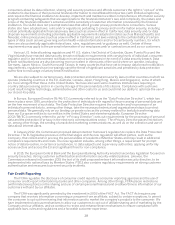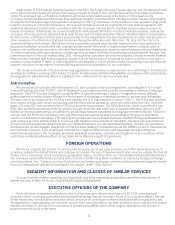American Express 2015 Annual Report Download - page 42
Download and view the complete annual report
Please find page 42 of the 2015 American Express annual report below. You can navigate through the pages in the report by either clicking on the pages listed below, or by using the keyword search tool below to find specific information within the annual report.
Additionally, in 2011, federal banking regulators, the SEC, the Federal Housing Finance Agency and the National Credit
Union Administration issued proposed rulemaking pursuant to Dodd-Frank on incentive-based compensation practices.
Under the proposed rule, all financial institutions with total consolidated assets of $1 billion or more (such as the
Company, Centurion Bank and American Express Bank) would be prohibited from offering incentive-based compensation
arrangements that encourage inappropriate risk taking by offering “excessive” compensation or compensation that could
lead the company to material financial loss. All covered institutions would be required to provide federal regulators with
additional disclosures to determine compliance with the proposed rule and also to maintain policies and procedures to
ensure compliance. Additionally, for covered institutions with at least $50 billion in total consolidated assets, such as the
Company, the proposed rule requires that at least 50 percent of certain executive officers’ incentive-based compensation
be deferred for a minimum of three years and provides for the adjustment of deferred payments to reflect actual losses or
other measures of performance that become known during the deferral period. Moreover, the board of directors of a
covered institution with at least $50 billion in total consolidated assets must identify employees who have authority to
expose an institution to substantial risk, evaluate and document the incentive-based compensation methods used to
balance risk and financial rewards for the identified employees, and approve incentive-based compensation arrangements
for those employees after appropriately considering other available methods for balancing risk and financial rewards. The
comment period for this rule ended in May 2011. Although final rules have not yet been adopted, officials from the Federal
Reserve have indicated that federal banking regulators are in the process of preparing for public comment a new rule on
incentive compensation. If these or other regulations are adopted in a form similar to what was initially proposed, they will
impose limitations on the manner in which we may structure compensation for our executives.
The scope and content of these policies and regulations on executive compensation are continuing to develop and
are likely to continue evolving in the future. It cannot be determined at this time whether compliance with such policies
and regulations will adversely affect our ability to hire, retain and motivate key employees.
Anti-Corruption
We are subject to complex international and U.S. anti-corruption laws and regulations, including the U.S. Foreign
Corrupt Practices Act (the “FCPA”), the UK Bribery Act and other laws that prohibit the making or offering of improper
payments. The FCPA makes it illegal to corruptly offer or provide anything of value to foreign government officials,
political parties or political party officials for the purpose of obtaining or retaining business or an improper advantage.
The anti-bribery provisions of the FCPA are enforced by the U.S. Department of Justice (“DOJ”). The FCPA also requires
us to strictly comply with certain accounting and internal controls standards, which are enforced by the SEC. In recent
years, DOJ and SEC enforcement of the FCPA has become more intense. The UK Bribery Act, which took effect in July
2011, also prohibits commercial bribery, and the receipt of a bribe, and makes it a corporate offense to fail to prevent
bribery by an associated person, in addition to prohibiting improper payments to foreign government officials. Failure to
comply with the FCPA, the UK Bribery Act and other laws can expose us and/or individual employees to potentially
severe criminal and civil penalties. The risk may be greater when we transact business, whether through subsidiaries or
joint ventures or other partnerships, in countries with higher perceived levels of corruption. We have risk-based policies
and procedures designed to detect and deter prohibited practices, provide specialized training, monitor our operations
and payments, and investigate allegations of improprieties relating to transactions and the manner in which transactions
are recorded. However, if our employees, contractors or agents fail to comply with applicable laws governing our
international operations, the Company, as well as individual employees, may face investigations or prosecutions, which
could have a material adverse effect on our financial condition or results of operations.
FOREIGN OPERATIONS
We derive a significant portion of our revenues from the use of our card products and other financial services in
countries outside the United States and continue to broaden the use of these products and services outside the United
States. (For a discussion of our revenue by geographic region, see Note 25 to our Consolidated Financial Statements.)
Our revenues can be affected by political and economic conditions in these countries as well as by foreign exchange
rate fluctuations. See “Adverse currency fluctuations and foreign exchange controls could decrease earnings we receive
from our international operations and impact our capital” under “Risk Factors.”
SEGMENT INFORMATION AND CLASSES OF SIMILAR SERVICES
You can find information regarding our reportable operating segments, geographic operations and classes of
similar services in Note 25 to our Consolidated Financial Statements.
EXECUTIVE OFFICERS OF THE COMPANY
Set forth below, in alphabetical order, is a list of all our executive officers as of February 19, 2016, including each
executive officer’s principal occupation and employment during the past five years. None of our executive officers has any
family relationship with any other executive officer, and none of our executive officers became an officer pursuant to any
arrangement or understanding with any other person. Each executive officer has been elected to serve until the next annual
election of officers or until his or her successor is elected and qualified. Each officer’s age is indicated by the number in
parentheses next to his or her name.
31
























